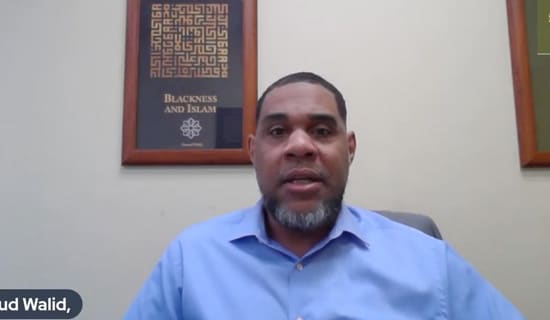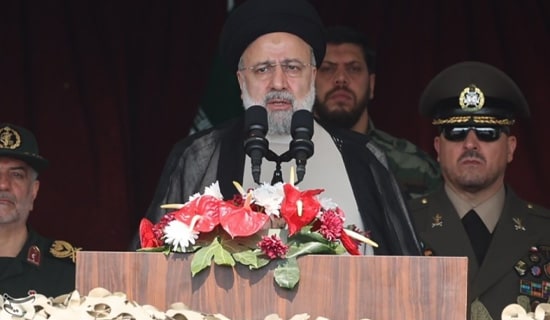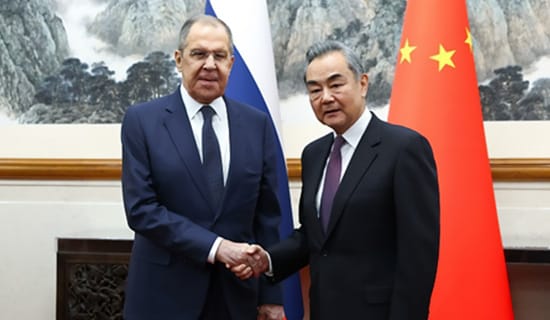In his May 21, 2013 column, Mashari Al-Zaydi, columnist for the London-based Saudi daily Al-Sharq Al-Awsat, harshly criticized President Barack Obama and his foreign policy, particularly as it relates to the crisis in Syria.
Al-Zaydi wrote that Obama's handling of the Syrian crisis had proven his failure as president, showing him as completely lacking in leadership ability, hesitant and diffident, and overall the weakest president in the history of the United States. He added that it is because of these failings that Obama allowed the crisis in Syria to escalate to the current situation, and that it is he who "caused the wound to become deeper and the bloodshed to continue." He also stated that Obama's hesitant and failed leadership in the Middle East, and especially in Syria, had laid the groundwork for the development of extremism and sectarian violence greater than those of Al-Qaeda.
This column by Al-Zaydi joins a series of recent articles in the Saudi press that attacked America's policy on Syria following the American-Russian agreement to hold an international conference at which a political solution to the Syrian crisis will be sought. For example, an article in the government daily Al-Yawm stated: "The Syrian opposition did not welcome the outcome of the meetings that U.S. State Secretary John Kerry held in Moscow [on May 6, 2013], because [this outcome] is a clear American retreat towards the position of the Russian-Iranian alliance. Considering the crimes of ethnic cleansing that have been perpetrated by Iran's and Assad's killing machine in Baniyas [in early May 2013], the American position is a clear [act of] capitulation to this killing machine at the expense of human rights and America's claims that it supports the freedom of the peoples…" The daily stated further that the U.S. is once again falling into the Iranian trap, as it did in Iraq.[1] Baina Al-Mulhim, a columnist for the government daily Al-Riyadh, asked whether the U.S. had "sold out the Syrian revolution," and wrote: "The crisis of the Syrian revolution changed with the appointment of [John] Kerry as U.S. secretary of state. Kerry is known as a friend of Bashar Al-Assad… and now he is traveling around the world trying to save Assad's regime and to eliminate the so-called 'Al-Qaeda in Syria'…"[2] Tariq Alhomayed, the former editor of Al-Sharq Al-Awsat, wrote that Obama's hesitancy was increasing the bloodshed and the extremism and allowing Russia to play a role in the region.[3]
The following are translated excerpts from Al-Zaydi's column: [4]

Mashari Al-Zaydi (image: Al-Sharq Al-Awsat, May 21, 2013)
"The problem of U.S. President Barack Obama can be summed up in a single word: hesitation. The man is short-sighted, confused and diffident. It seems that the gist of his policy is disagreeing with every position of his predecessor, George W. Bush, and that is quarrelsomeness, not policy.
"This assessment of Obama's policy is not voiced only by his Republican rivals in the U.S., or by those who hate some [aspects] of his global [foreign] policy, but also by some proponents of his own school of thought, like the well-known American author David Ignatius, who recently wrote a critique of the Obama administration's policy that was not confined to foreign [policy] affairs... Summarizing the problematic aspects of Obama's conduct, he said that the public is more afraid of a weak administration than a strong one!
"We are not talking [only] about harsh critics of this administration, inside or outside the U.S. This is apparent from a recent article by Lebanese-American writer Fuad 'Ajami, who slammed Obama for his feebleness, his lack of leadership, and his inability to take bold decisions under difficult circumstances, especially when it comes to his position on the Syrian catastrophe. Nor is it only Republicans who attack [Obama]. [Criticism is also voiced] by people who were overjoyed by the arrival [in the White House] of a black Harvard graduate with African and Islamic roots, the son of Hussein Obama. [They expected him] to have a better understanding of the Islamic and Arab societies and their nature. But eventually, as the helplessness of the international community [to address the situation] in Syria increased due to the [conduct of] the U.S. and Obama, it became apparent that this man is unable to lead and that he hides his failure and ignorance behind a lot of hypothetical talk about red, green and purple lines..."
Obama Is Responsible For Exacerbating The Syrian Crisis
SUPPORT OUR WORK

"Perhaps he is sincere in his belief in democracy and has [genuine] sympathy for other nations, especially those of Asia and Africa, [and perhaps he really believes that] America's problems in the world can be eliminated by improving its image and expressing appreciation for other cultures. Perhaps he really feels that way, but feelings are one thing and reality is another. I wish matters could be resolved through good intentions [alone]...
"Evidence of Obama's narrow approach to the Syrian crisis can be found in statements he made to Turkish Prime Minister Recep Tayyip Erdogan in their meeting several days ago. [He said that] there was no 'magic solution' to the escalating Syrian crisis and that a realistic solution was needed, [namely] a non-ideal political solution. [But Obama] is the one who complicated the Syrian problem and caused the wound to grow deeper, the bloodshed [to continue]... the voices to grow louder and the thugs to interfere, from Hassan Nasrallah's militia... to the young men who come from all over [the world] to fight jihad in [the ranks of the Al-Qaeda-affiliated organization] Jabhat Al-Nusra.
"[Obama] is responsible for the fact that Syria has reached this level of confusion and loss. Were it not for his hesitancy, his weak approach, his lack of determination and his eagerness to [gain] popularity on Twitter... the Russian 'Snow Emperor' Vladimir Putin wouldn't have dreamt of attaining the role [he has attained], with the Western world ready to charge him with the task of solving the Syrian problem. [Were it not for Obama's weakness,] Bashar Al-Assad would not have said in a recent interview with the Argentinean paper [Clarin] that he felt he was beginning to overcome the intense pressures that have been exerted upon him. [Moreover,] Iran's arrogance and contempt wouldn't have grown to the point of making a public announcement that the war in Syria is its own war and [to the point of] ordering its [operations] officer in Lebanon, Hassan Nasrallah, to declare war and launch resistance [actions] – not on the Israeli border but against the Syrians in Al-Qusair, which has been besieged by Assad's shabiha[5] and by Nasrallah's fighters for a while, right in front of Obama!
"The U.S. is currently living under one of the weakest leaders in its [history]... while Russia has a firm and determined leader. This becomes even sadder when you realize that the U.S. is believed to be supporting the Syrian rebels while Russia [is considered] a supporter of the [Syrian] regime. In this situation, the alliance [between the U.S. and the rebels] is a liability more than an asset...
"The most acute [aspect of] the problem is that Obama is laying down the systematic groundwork for the development of extremism and sectarian violence that will make us miss the Al-Qaeda of George W. Bush's era, while deluding himself that he eliminated Al-Qaeda when he killed Osama bin Laden!"
Iraq, Syria, Lebanon And Perhaps Also Turkey Face "Great Danger" Because Of Obama's "Policy Of Wholesale Retreat"
"There is great danger in what is happening in Iraq, Syria and Lebanon and may soon also happen on Turkey's southern border because of the policy of wholesale retreat that Obama is employing without any deep consideration. These countries – and probably also Egypt and North Africa, in a different way – are about to enter a terrifying era of religious terrorism, sectarian war and civil strife that will harm everyone. The Al-Qaeda attacks of the recent years pale beside what might happen in the future and what is already happening: [the fighting] in Homs and its rural area, the attacks on mosques and Husseiniyyas [Shi'ite cultural and religious centers] in Iraq, and [the attacks of] the Turkish 'Alawite fighters [of the Popular Front for the Liberation of] Alexandretta,[6] who are coming to the aid of the 'Alawites in Syria.
Al-Qaeda's former attacks were high-quality and were carried out be elite squads of fighters, [but these fighters] did not represent broad sectors of Arab society. The wars currently being waged in Syria, Lebanon and Iraq, on the other hand, are frightening because they rely on [entire] social [sectors] that support [the fighters] and shelter them.
"This leads us to a frustrating conclusion about Obama's precise and rigid implementation of his bad and superficial policy of retreating [from the Middle East] at any cost, even in the face of new developments. [We must conclude that] this is not a skilled statesman and politician with creative solutions, but an ordinary academic who repeats meaningless slogans and does not possess the political sensitivity to give each factor the weight it deserves, to take bold [action] when necessary and to refrain [from action] when necessary..."
[1] Al-Yawm (Saudi Arabia), May 8, 2013.
[2] Al-Riyadh (Saudi Arabia), May 12, 2013.
[3] Al-Sharq Al-Awsat (London), May 18, 2013.
[4] Al-Sharq Al-Awsat (London), May 21, 2013.
[5] The popular name given to the Syrian regime's plainclothes militia, which is assisting the regime security forces in suppressing the uprising.
[6] An organization established in 2012 by pro-Assad Syrians on the Turkish border. Its stated goal is the liberation of Alexandretta from the rule of Turkey, which is now among the countries opposed to Assad's regime. Assad's opponents claim that the members of the organization are 'Alawites.




